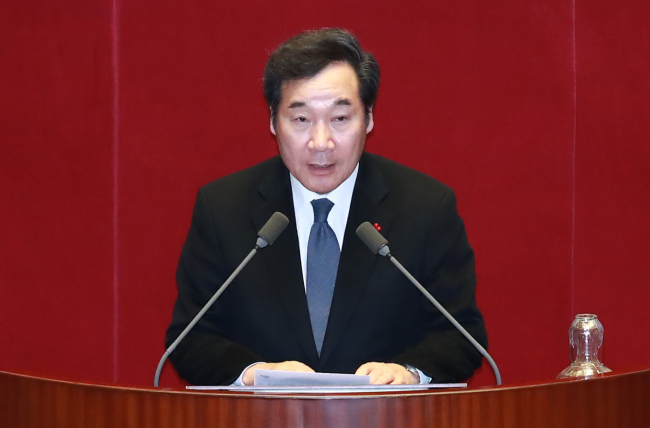The 2018 government budget passed Tuesday, with social security, defense, education and central and local administration spending receiving the biggest bumps.
Of next year’s 428.8 trillion won ($392 billion) budget, about one-third, or 144.7 trillion won, has been allocated to areas concerning social security -- welfare, health and labor. The figure is an increase of 11.7 percent from this year, while the overall budget was increased by about 7 percent.
 |
Prime Minister Lee Nak-yeon addresses the National Assembly in the early hours of Wednesday after the budget was approved. Yonhap |
The budget allocated to education-related areas was increased by 11.8 percent to 64.2 trillion won, while that for central and local governance was raised by 8.9 percent to 69 trillion won.
Of the social security budget, 63.15 trillion won is allocated to the Ministry of Health and Welfare, which will oversee some of the Moon administration’s key welfare pledges, including higher basic pensions and child subsidies.
Under a budget approved by the parliament, the universal child care subsidy promised by Moon will now exclude the top 10 percent of earners, and will be rolled out from September, instead of July as planned by the government.
Along with the child care subsidies, plans for raising the basic pension to 250,000 won a month have been pushed back to September, from the originally planned April.
The funding for “Moon Jae-in Care” -- an expansion of national health care envisioned by President Moon Jae-in -- has been cut by 220 billion won to 5.2 trillion won.
The Ministry of Employment and Labor will also get a massive boost in its budget next year, in large part to finance Moon’s drive to raise the minimum wage. The ministry will be allocated nearly 23.8 trillion won next year, up 27.6 percent, or 5.14 trillion won, from this year.
The bulk of the increase will be used to subsidize small businesses -- those with under 30 employees -- to lessen the impact of the minimum wage hike.
Next year’s minimum wage has been set at 7,530 won per hour, up 16.4 percent from this year, and Moon hopes to raise the figure to 10,000 won during his term.
The country’s defense budget was given the largest year-on-year boost in nine years, rising 7 percent from this year to 43.2 trillion won.
The large increase has fueled in large part by the drive to improve South Korea’s military capabilities, in particular those aimed at countering North Korea’s missile threats.
With North Korea continuing its missile and nuclear weapons programs, Moon has emphasized the need to secure “overwhelming power” to keep the regime in check.
Under the plans, the government is pushing to complete the establishment of the “three-axis” defense platform – the Kill Chain pre-emptive strike system, Korean Air and Missile Defense system and Korea Massive Punishment and Retaliation scheme -- by the early 2020s.
While the Ministry of Environment’s budget is to be reduced, it has been given more than 140 billion won for projects that aim to improve water quality for the “four big rivers.”
The Han, Nakdong, Yeongsan and Geum rivers were subjected to extensive construction work during the Lee Myung-bak administration. Environmental groups argue the projects caused significant environmental damage in the areas.
Influenced by the recent earthquake that shook Pohang, North Gyeongsang Province, the parliament raised the budget for such disaster projects. The earthquake-related budget approved by the parliament is 127.9 billion won higher than that drawn up by the government.
Projects to be funded by government budget include research on faults, measures for quakes and tsunamis and reinforcing buildings of state-run universities and urban rail networks.
By Choi He-suk (
cheesuk@heraldcorp.com)








